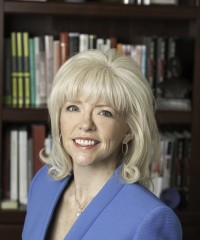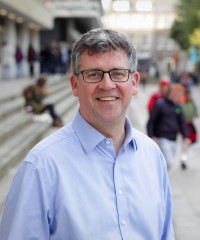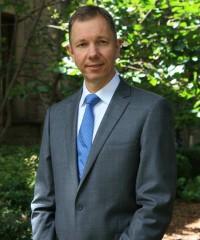“Learning is a Lifelong Journey”
Some are natural-born leaders. Others work hard at it, while others fall into it. No matter the path, all who lead can benefit from the guidance and support of those who have experienced the ups and downs of leadership. That’s why CASE developed a unique, seven-month course to give new and aspiring leaders in advancement the knowledge, guidance, and supportive community to help them lead with confidence.
CASE Academy is a leadership course for advancement professionals taught by some of the most successful, respected leaders in the field. CASE Academy provides advancement professionals with the opportunity to engage with and learn from each other and from accomplished faculty. The course is based on the CASE Competencies Model, combining both strategic guidance and practical advice to prepare participants to serve as leaders throughout their careers.
Here, we asked four CASE Academy faculty members to share their thoughts on the value of continuous learning, the best leadership advice they’ve received, and more. They are:

Amy Bronson

Chris Cox

Nathalie Fontana

Alex Furman
CASE: The Academy sessions are based on the CASE Competencies Model. On which competency are you leading a discussion, and why is it important to the advancement field?
Amy Bronson: As part of the advancement leadership [team] under Sue Cunningham [CASE President and CEO] that helped create the CASE Competencies and design the CASE Academy curriculum, as well as in my role as a talent development leader in our industry, I’m familiar with them all. However, in the Academy for the past three years I have taught in the final session which prepares the participants for their ongoing leadership journey once they graduate from the course. Taking this course does not make you a leader but provides you with a compass and a map to become one. Our institutions are constantly evolving, so we must evolve as leaders and be prepared to adapt to best serve the people we lead. Leadership is a lifelong journey.
Chris Cox: This year I co-led the session on Leadership, Integrity, and Professionalism with Alex [Furman]. We work in a profession that can still easily be misunderstood, where people (both within and beyond our campuses) can easily make ill-informed or sometimes lazy assumptions. It feels more and more important that we encourage knowledge of, and adherence to, ethical codes of conduct and professional standards that have been developed by CASE and others.
Alex Furman: I was fortunate to co-present with Chris [Cox] on Leadership, Integrity, and Professionalism. My part focused on leadership, which, of course, is an infinitely broad and diverse subject. Leadership, integrity, and professionalism are crucial to advancement because they are part of the bedrock that builds and sustains trust within our institutions and our wide community of donors, alumni, and friends. Trust is necessary to do our work!
Nathalie Fontana: [I teach] Global and Intercultural Competence. We are living and working in a global environment that is much more diverse than it used to be. Understanding different cultures, speaking more than one language, and being able to “translate” cultural behavior with empathy into our day-to-day doing, whether within a diverse team or with external stakeholders and academics, is an invaluable asset for inclusive leadership. It will help build bridges and make people feel understood.
CASE: What excites you about being a CASE Academy faculty member?
Bronson: When I was asked to help develop the curriculum, I was thrilled CASE wanted to address something our industry has truly needed for a long time. A title does not make a leader, and while I have worked with amazing leaders in this industry, there are many who rose quickly through the ranks without being ready and it has impacted the organization and its success.
Two things are most exciting to me: first, the engagement and curiosity of our participants. As faculty, besides teaching the main program, we meet with a small cohort each month. The interaction and self-discovery that takes place is wonderful to witness. The other thing that brings me back each year is the stellar faculty—they are truly impressive leaders with so much insight to share. I never fail to learn something new. And the CASE staff who help us get through the program are true innovation partners.
Cox: That’s simple—learning with great colleagues on the faculty, and with up-and-coming advancement professionals who are determined to do their best and to inspire their teams to make the world a better place.
Fontana: I have been in the higher education advancement sector for 20 years. The experience and knowledge I gained is a “good” that needs to be shared. The more rising leaders can learn and benefit from experienced leaders the better. Besides, it keeps me in a learning space—learning is a lifelong journey. It goes both ways and only then it will strengthen the sector.
Furman: I had the opportunity to meet with program participants from across the world—they are so inspiring! My 2023/2024 cohort was a hugely passionate and committed, incredibly thoughtful with their questions and the way they approached incorporating insights from the course into their work. I feel I learned much from them, too. I was also humbled to be part of such a distinguished faculty.
CASE: Why should advancement professionals consider enrolling in CASE Academy?
Bronson: I wish this program was around when I came up through the ranks. Besides the content and quality of the teaching and the program, it is an unbelievable networking and coaching opportunity. Participants come from all over the world and we have witnessed partnerships and mentoring relationships take off and continue after the program.
I would make one important point for anyone who is considering the Academy—be prepared to engage, be open to feedback, have a plan to manage the work outside the course, and be curious always.
Cox: There are plenty of training opportunities that focus on the “what.” There are very few that focus on the “how.” More specifically, the Academy gives nuanced advice on how to navigate changing expectations of our roles in a changing and challenging world, with a strong focus on emotional intelligence as a key leadership trait. We all learn a great deal from each other. The sessions are serious, energizing, challenging, and fun all at the same time.
Fontana: The network and knowledge that is available via the Academy is so comprehensive: the diversity of participants, the great wealth of experience and knowledge the faculty shares, and the potential to personally and professionally grow and build up a network of peers that is worldwide.
Furman: It offers a unique leadership journey that allows for insights and learning from peers and global leaders in our profession. I encourage participation due to the breadth of the topics offered over the course and the new networks and support resulting from the program.
CASE: What piece of career advice has most guided your leadership?
Bronson: I’ve been fortunate to have amazing mentors over the years, but one piece of advice that has really stuck with me is that “no one will see you as a leader until you see yourself as one first.” In other words, ask yourself, “Why would anyone want to follow me?” and be self-aware enough to understand if you're ready to lead or work on developing yourself further, or if you are not. You must know what strengths you bring to the role—as well as your vulnerabilities.
For example, in the Academy each participant takes a CliftonStrengths assessment and is provided with a coach to help them discover and develop their innate strengths, as well as areas they need to develop. You must be able to ask someone you trust about your leadership readiness and be prepared to take honest feedback.
Cox: I was discussing a staffing matter in confidence with Jack Jeffery, business leader and a key volunteer as Chairman of the Graduate Council at the University of Newcastle, Australia. He clearly felt I was in danger of rushing to judgment on a specific individual. He smiled and said, “Just remember, Chris, very few people come into work aiming to do a bad job.” That has always stuck with me. Fight any natural inclination to focus on people’s weaknesses. Instead, help them play to their strengths.
Furman: For me, being open and curious about other people’s perspectives and embracing new and different ways of doing things has been great advice. Although it sounds simple, applying this mindset to leadership can be very challenging, particularly when balancing multiple external or institutional pressures with the needs of an advancement division, a team, or an individual. Staying true to this advice, though, is ultimately very rewarding.
Fontana: Always be yourself; keep focused on the big picture. Listen well and do not overpromise.








